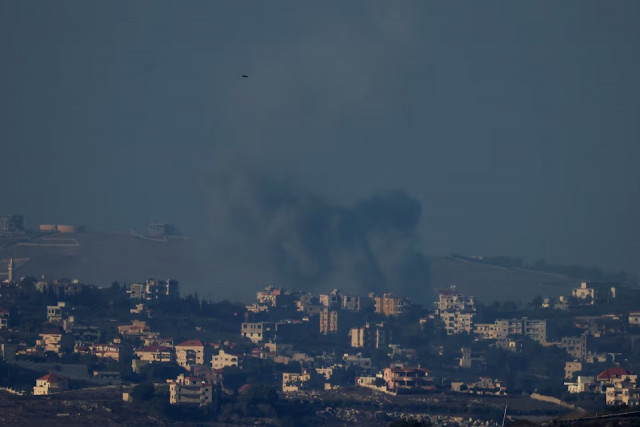Israeli airstrikes hit multiple Hezbollah and Houthi positions
Four killed, 29 wounded in Yemen while at least 105 people killed in new Lebanon attacks; Hezbollah will keep firing

Israel stated that it targeted Houthi positions in Yemen on Sunday and conducted additional airstrikes in Lebanon, broadening its conflict with Iran's regional allies just two days after the assassination of Hezbollah leader, Sayyed Hassan Nasrallah.
The air raids on Yemen’s port city of Hodeidah were in retaliation for recent Houthi missile strikes on Israel, amid concerns that ongoing Middle Eastern hostilities could escalate, drawing in Iran and the United States, Israel’s primary ally.
The Houthi-run health ministry reported that at least four people were killed and 29 others injured. Meanwhile, Israel also continued its assault on Lebanon, where intensified bombardments over the past two weeks have led to the deaths of numerous high-ranking Hezbollah figures and the displacement of hundreds of thousands of residents.
Lebanon’s Health Ministry confirmed that Israeli strikes on Sunday killed at least 105 people, including 32 in Ain Deleb in the south and 33 in Baalbek-Hermel in the northeast. Additionally, 14 medical personnel have been killed by airstrikes over the last 48 hours. Israel announced its intention to persist with the offensive.
“We need to keep hitting Hezbollah hard,” said Israel’s Chief of Staff, Herzi Halevi.
Israeli drones hovered over Beirut throughout the night and much of Sunday, with powerful explosions from renewed airstrikes resonating across the Lebanese capital.
Clashes between Hezbollah and Israel across the Lebanese border have intensified since the outbreak of the Gaza war, which followed an attack by Hamas militants on 7 October. Yemen’s Houthis have intermittently attacked Israel during this period, causing disruptions in Red Sea shipping routes.
Two weeks ago, Israel sharply escalated its operations against Hezbollah, targeting its leadership to ensure the safety of its northern regions and facilitate the return of residents. Israel’s defence minister has now raised the possibility of expanding the offensive.
Nasrallah’s death marked a significant blow to Hezbollah, which he led for 32 years, prompting retaliatory rocket attacks on Israel from Hezbollah. Iran has vowed to avenge his death.
The United States has called for a diplomatic solution to the crisis in Lebanon while also authorising its military to reinforce its presence in the region.
When asked whether a full-scale conflict in the Middle East could be avoided, US President Joe Biden responded, “It has to be.” He indicated he would be in communication with Israeli Prime Minister Benjamin Netanyahu.
US Senator Mark Kelly noted that the bomb Israel used to eliminate Nasrallah was an American-manufactured 2,000-lb (900-kg) guided weapon.
In Iran, high-ranking officials mourned the loss of a senior Revolutionary Guards member who died alongside Nasrallah. Tehran has requested a United Nations Security Council session to address Israel’s actions.
Sources informed Reuters that Iran’s Supreme Leader Ayatollah Ali Khamenei has been relocated to a secure location following Nasrallah’s death.
Lebanese casualties
Nasrallah’s body was found intact at the site of the strike on Friday, according to both a medical source and a security source. Hezbollah has yet to announce when his funeral will take place.
Nasrallah transformed Hezbollah into a formidable domestic force in Lebanon and a central figure within Iran’s network of allied groups across the Arab world. Many in Lebanon mourned his death on Sunday.
“We have lost the leader who gave us strength and faith. He made us believe that our small nation could become a paradise,” said Sophia Blanche Rouillard, a Lebanese Christian woman carrying a black flag to work in Beirut.
Lebanon’s Health Ministry reported that over 1,000 Lebanese people have died, and 6,000 have been injured in the past fortnight, without specifying the number of civilian casualties. The government estimates that one million people — about a fifth of the population — have fled their homes.
In Beirut, some displaced families spent the night on benches at Zaitunay Bay, a waterfront area lined with restaurants and cafes. On Sunday morning, families with only a duffle bag of clothing rolled out mats to sleep on and made tea.
“No matter how much you bomb or displace us, we will stay. This is our country, and we’re not leaving,” said Francoise Azori, a Beirut resident seen jogging through the area.
The United Nations World Food Programme has begun an emergency initiative to supply food to those impacted by the conflict. Saudi Arabia and France have also pledged to send medical assistance.
Israeli military actions
Israel’s military confirmed that it struck multiple targets in Lebanon, including launch sites and weapon depots, and intercepted eight projectiles originating from Lebanon and one from the Red Sea.
Additionally, Israel stated that its aircraft had targeted power plants, Ras Issa, and Hodeidah ports in Yemen, accusing the Houthis of operating under Iranian direction and collaborating with Iraqi militias.
Israeli Defence Minister Yoav Gallant declared: “Our message is clear — no location is beyond our reach.”
Nasrallah’s death concluded a turbulent fortnight for Hezbollah, which began with the explosion of thousands of communication devices used by its members — an act widely attributed to Israel.
Hezbollah’s arsenal has long been a contentious issue in Lebanon, a country with a history of civil conflict. Critics argue that Hezbollah’s unilateral decisions have dragged Lebanon into unwanted conflicts and undermined the state.
However, Lebanon’s highest-ranking Christian cleric, Maronite Patriarch Bechara Boutros Al-Rai, expressed that Nasrallah’s killing had “opened a wound in the heart of the Lebanese”. Al-Rai has previously criticised the militia’s activities.



















COMMENTS
Comments are moderated and generally will be posted if they are on-topic and not abusive.
For more information, please see our Comments FAQ